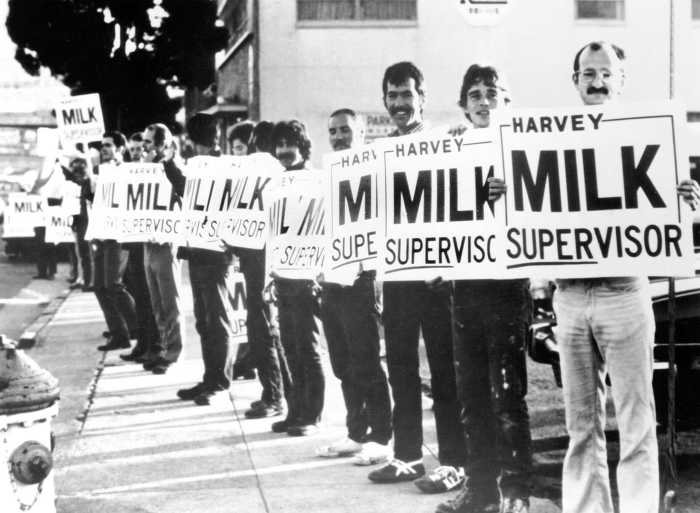December may be focused on the holidays, but this month’s LGBTQ films available for streaming focus largely on gender issues and identity. Here is a rundown of five stylized non-holiday titles to watch.
“The Schoolmaster Games” (now available on DVD and digital)
The Swedish import, “The Schoolmaster Games,” opens with a provocative scene involving a semi-naked student that suggests that writer/director Ylva Forner’s adaptation of Kristofer Folkhammar’s novel is going to be naughty. After all, it is set at an all-male, all-gay academy named St. Sebastian. However, despite the schoolmaster (Johan Ehn) lusting after Charles (Christian Arnold) and even tying him up at one point, most of this film addresses the rivalries and jealousies that develop between Paul (Johan Charles) and Tim (Simon Kling) who are competing for top position in the school’s Winter Procession. While the film touches on valid themes of erotic desire and unrequited love and includes an episode of homophobic cruelty — the schoolmaster has a traumatic past — Forner’s stylish film gets all dressed up only to go nowhere slowly.
“Please Baby Please” (now available on digital)
For anyone who missed it at NewFest, the gender-bending musical drama “Please Baby Please” is a very peculiar, highly stylized but uneven film. Arthur (Harry Melling) and Suze (a very expressive Andrea Riseborough) have a life-changing encounter with Teddy (Karl Glusman) and his gang, The Young Gents. The film, directed and cowritten by Amanda Kramer, is affected with both camp and 50s-era sensibilities that will charm or annoy. Kramer candy-coats each scene and fetishizes its characters — Teddy especially (Glusman oozes sex appeal) — as they pose, fight, sing, and dance. “Please Baby Please” is not just all mood, though. Its characters espouse heady comments about gender, masculinity, and vulnerability. Harry claims he “doesn’t feel a need to act male,” while Suze becomes more masculine over the course of the story. There are also some nifty musical numbers and striking vignettes, from one featuring Maureen (Demi Moore) as a “slum starlet” neighbor, to a scene in a club with a flirty gay character, and another sequence at a Bijou movie theater. “Please Baby Please” can feel like it is trying too hard, but it is a unique and, at times, impressive accomplishment.
“Queer Genius” (available on OVID December 1)
“Queer Genius” is a galvanizing documentary that profiles five queer female artists. The film opens with a segment on the late Barbara Hammer, who talks about her life, her archive, her legacy, and her career as visual artist. Rasheedah Phillips and Camae Ayewa (aka Moor Mother), run a Black Quantum Futurism collective in North Philadelphia and pair soundscapes with spoken word to engage with queer voices and science fiction. They also talk about their lives and experiences and theories in compelling interviews. “Queer Genius” next showcases Jibz Cameron aka Dynasty Handbag, who is seen in her closets talking about her favorite outfits, as well as performing on stage. Rounding out the documentary is a portrait of lesbian poetess Eileen Myles, who has achieved considerable fame in her career. She is seen reading her work and discussing her life, her sobriety, and her political attitudes. This documentary is an inspiring portrait of provocative and legendary artists-activists.
“Homebody” (available on digital and Fandor December 6)
“Homebody” is queer writer/director Joseph Sackett’s slight but winning feature about Johnny (Tre Ryder), a young gender non-conforming boy who dreams about his babysitter, Melanie (Colby Minifie). He prefers being at home with her than going outside, where classmates ask if he is a girl. When Johnny and Melanie do some free-spirit meditation, something happens, and Johnny is transported “inside” Melanie’s body; he can now live like the girl he wants to be. “Homebody” takes this sit-comic premise and has Johnny learning how to be Melanie, which includes walking in heels, and learning what a tampon is, as well as fending off the sexual advances of her friend Tom (Whitmer Thomas) who thinks Melanie is texting him for sex. But the real tension comes from Melanie, a doula, having to help lesbians Sharon (Jasmin Walker) and Priya (Purva Bedi) deliver a baby. “Homebody” has some scenes that strain credibility—such as Melanie’s encounter with a high school friend—but it also has some interesting observations on gender identity as Johnny learns what it is like to be female. Minifie carries the film with her “dual” performance and there is terrific support from Maria Dizzia as Johnny’s mom.
“Phantom of the Sauna” (available December 13 on demand)
“Phantom of the Sauna” opens as a campy musical with three muses—drag queens representing Love, Lust, and Regret—telling the story of love and death at Madrid’s Sauna Popular. Javi (Nestor Goenaga) arrives at the establishment looking for a job. Asun (Antonia San Juan) is reluctant to hire him, but her son, Dario (Pablo Liñares) is smitten with the twink. After Javi learns the ropes of the business — a fun musical number has Asun singing about semen in the jacuzzi — he also spies a phantom who lurks in the sauna. And the mysterious masked and caped man bites off the member of one of the patrons leading to a search for the wounded man’s organ and the announcement, “We’re looking for a dick!” There is also a hokey séance episode, Asun’s dead husband comes briefly back to life, and the male chorus dances around in towels. But “Phantom of the Sauna” is really a romance. Javi meets Eric, the handsome phantom who lives in the sauna. Eric appreciates Javi’s singing voice and grows concerned when Asun arranges for Javi to audition for the count (Fernando Albizu), who literally wants a pound of flesh in exchange for his favors. The singing is quite nice, and the guys are attractive, which makes “Phantom of the Sauna” an agreeable film despite its uneven tone.





































